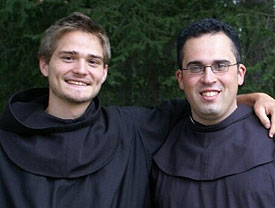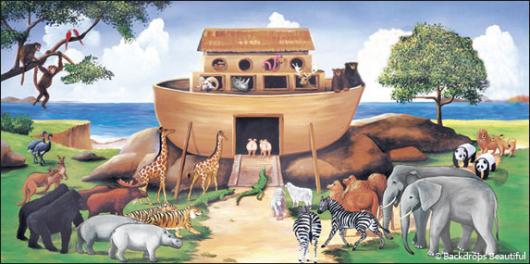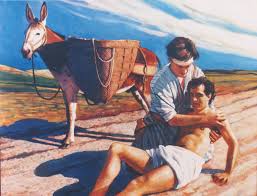The Dreamers first meeting is with two friars who claim that Do-Well lives with them. The Dreamer disputes it, and the discussion shows the critical and argumentative side of Will Langland. He no great respect for people on account of their profession or status and can be quite offensive at times. Friars are something of a hate object for him, and they will get additional broadsides later on. The Dreamer then meets THOUGHT (allegorical) and asks "Who are you?" The reply is "You ought to know me because I have been beside you the last seven years." The Dreamer does not get much extra knowledge about Do-Well since THOUGHT largely reflects what was in his head already. But THOUGHT agrees to introduce him to WIT who perhaps represents a more critical examination of what he knows and possibly some intellectual theorising.
What WIT has to say is a fine mixture of descriptive text about how Do-Well behaves and instances of quite opposite behaviour. There are frequent references to Cain, the biblical first son of Adam who murdered his brother Abel and was seen in Langland's time as the source of all evil acts. The responsibilities of the church (not always observed) are also mentioned frequently.
"I find Holy Church should feed all fatherless children,
And fools and frantic folk that are in want of judgement,
And widows who have no wealth to win them food."
Good behaviour is often contrasted with bad, and Langland's descriptive genius leads him to include the punishments that God hands out. His lines about Noah's Ark have a colloquial directness that contrasts with the heavy seriousness of the Bible story.
" Quickly go build a boat of boards and planks
Yourself and your three sons and also your wives
Set yourselves up in that ship and stay inside it."
" All shall die for his deeds on downs and hills,
And the fowls that fly forth along with other beasts
Save for a single couple of every sort that there is
That in the shingled ship shall be saved."
The injustice of this mass destruction leads Langland into speculation about one of the great religious dilemmas: sons being punished for the sins of the fathers. Langland offers his own solution, which is logical enough.
"But I find that if the father is false and a scoundrel
That to some degree the son shall have his sire's faults.
Graft applewood on an alder and if your apple is sweet
It would seem to me most marvellous...."
The father-son relationship opens the door to general comment on family life and Langland has something to say about marriages made for financial gain. That is wrong.
"And so is wedding a widow for her wealth
When her belly can no longer bear a man bairns."
Shortly after that come one of the definitions of Do-Well that Langland offers from time to time. All are slightly different, as if he is never quite sure what words are best.
"To do well is to do as the law ordains,
But believe me friend, to love friend and foe
Is better, and best is to aid and to help
Both young and old with healing and alms.
A Do-well will dread God, a Do-better suffers,
And a Do-best does both and brings within bounds
The wayward will that thwarts good works
And drives out Do-Well through deadly sins."
Wit promises to introduce the Dreamer to his wife, who is named as DAME STUDY. She is a superior being, as implied by fact that study involves hard work while wit does not. She comes across as arrogant and contemptuous and is viciously sarcastic to Wit. Why? Does Langland want to emphasise the greater value of learning or is he reflecting a husband/wife relationship known to him?
"'You are a wise man, Wit, to waste your teaching
On flatterers and fools, deficient in understanding
She blamed him and banned him and bad him be silent,
With his learned language lecturing blockheads."
When in critical mode Langland selects targets almost at random, and his focus is soon upon the halls of rich men and the 'celebrities' who grace the top table and the entertainers who perform after dinner. About the former;
"They drivel on the dias a definition of Godhead,
And set their teeth in God's gorge when their guts are
full."
Of the latter;
"Their knowing of minstrelsy and music to gladden men
Is what Mund the Miller knows of Multa fecit Deus.
If lewdness lent not it's aid, the Lord have my troth,
Would never king nor knight nor canon of St. Paul's
Give them a gift.......of a groat's value.
The Dreamer humbles himself before Dame Study and is rewarded by an introduction to her cousin CLERGY and his wife SCRIPTURE, with a promise that they will be able to tell him about Do-Well. These are religious authorities and perhaps well qualified to help in a religious quest. But Dame Study says that she taught them everything they know. Langland makes Dame Study a-moral, putting knowledge above all as does a pure scientist. Her claims range from the erudite back to educational basics. She was responsible for making Plato learn poetry and Aristotle argument and teaching masons rule and line. Also,
"I caused men first to give grammars to children,
And beat them with a broom if obstinate in learning."
Langland is always critical of people who pride themselves on cleverness and it shows up when Dame Study speaks of intellectual disciples that she regards as dodgy.
"But the subject that's especially slippery and unsafe
Is the fraud of alchemy, which befuddles and is false:
If you want to do well keep away from that.
I invented these sciences and their subtleties myself
For the simple purpose of deceiving people."
The Dreamer then hurries off to his next encounter.





